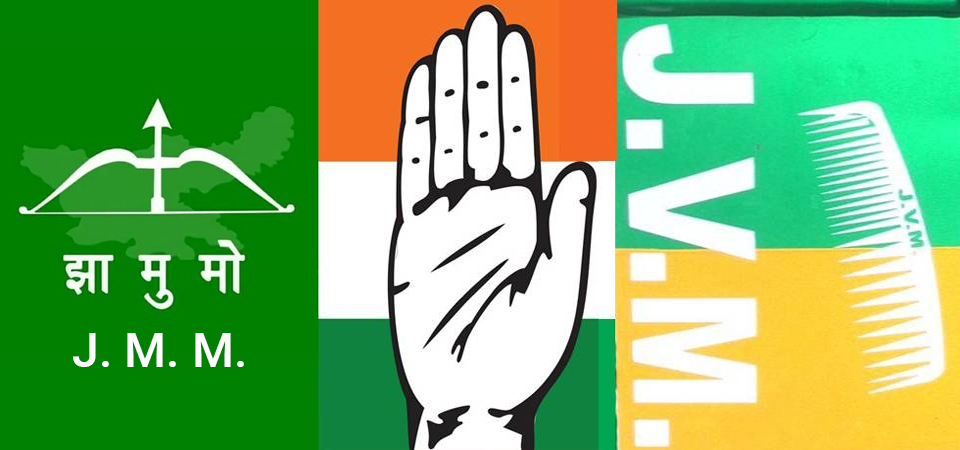
Tribal alliance may weaken BJP's poll prospects in Jharkhand

Since the formation of Jharkhand in 2000, the state has been a stronghold of the BJP which has been in power for a long time. The party this time, however, faces a strong opposition from a tribal alliance led by the Congress.
The BJP won 12 of the total 14 seats in the Lok Sabha polls in 2014, while the Jharkhand Mukti Morcha (JMM) led by former Chief Minister Sibhu Soren won the remaining two seats. In the 2014 Assembly, however, the ruling party and its alliance (All Jharkhand Students Union Party) won 42 seats, while the Congress, JMM, and JVM(P), bagged 33 seats. The state will go to Assembly elections later this year.
The grand alliance
Congress, which failed to retain its lone seat in the 2014 Lok Sabha polls, has formed a grand alliance to take on the BJP in the general elections this year. The alliance comprises the Congress, Jharkhand Mukti Morcha (JMM), Rashtriya Janata Dal (RJD), Left Front and former chief minister Babulal Marandi’s Jharkhand Vikas Morcha (Prajatantrik) (JVM-P). Tribal votes are expected to be consolidated, especially when all regional parties of the state are coming together to unseat the BJP.
The arithmetic
Considering that the BJP swept 12 constituencies in the 2014 Lok Sabha polls, a simple vote share calculation based on the grand alliance suggests that the ruling party may face the heat in six of these constituencies.
This includes Kodarma, where the ruling BJP has denied ticket to its sitting MP, Ravindra Rai. The party instead fielded Annapurna Devi, former RJD state chief who recently joined the BJP. Experts attribute the move to the rising popularity of Rajkumar Yadav, a CPI (Marxist-Leninist) candidate. Yadav, an MLA from Dhanwar is a mass leader, whose vote share saw a stupendous rise from 1.3 lakh in 2004 to 2.5 lakh in the 2014 general elections.

Another advantage of the grand alliance is the fact that Marandi’s JVM(P) enjoys a considerable support in Kodarma with Marandi being a five-time MP from the constituency. Kodarma, one of the most politically important seats in Jharkhand, is going witness a triangular fight among Marandi, Devi and Yadav.
The ruling party may also lose a seat in Giridhi, where it has given the ticket to its alliance partner, AJSU. Here JMM is likely to battle it out. It has nominated lawmaker Jagarnath Mahato for Giridih Lok Sabha seat. In 2014, Mahato lost the seat to the BJP’s Ravindra Kumar Pandey by over 40,000 votes.
In Godda, Chatra and Lohardaga constituencies, the vote share of Congress and its alliances is more than that of the BJP. In 2014, the ruling party won Lohardaga and Godda by thin margins of 1% and 5.8%, respectively. Lohardaga, however, has been a stronghold of the BJP for over a decade. Since 2009, the seat is being held by BJP’s Sudarshan Bhagat, the union minister of state for Tribal Affairs.
Losing ground
On April 10, in an interesting turn of events, BJP’s five-time MP from Ranchi Tahal Choudhary resigned from the party, after he was denied a ticket. The 77-year-old who is now contesting as an independent, is likely to cut into the votes of BJP’s Ranchi candidate, Sanjay Seth. In 2014, Choudhary won by a margin of 1.9 lakh votes after defeating Congress’ Subodh Kant Sahay.
Similarly in Khunti, which comes under the Red Corridor experiencing considerable Maoist insurgency, the BJP has replaced eight time MP and former deputy speaker of Lok Sabha Kariya Munda with former chief minister Arjun Munda. Kariya Munda has been in power in this constituency since 2009. The change may result in a subsequent shift in vote shares.
BJP’s bastion
This leaves BJP with just five seats where it has a strong hold. These constituencies include Hazaribagh, where the BJP has once again fielded Union minister Jayant Sinha. In 2014, Sinha defeated Saurabh Narain Singh of the Congress by 1.59 lakh votes. In 2019, Sinha will be contesting against CPI’s Bhuvneshwar Kumar Mehta and Congress’ Gopal Sahu. Other constituencies where the BJP has better chances of retaining seats include Dhanbad, Jamshedpur, and Singhbhum.
Tribal votes
In Jharkhand, tribals have traditionally voted for regional parties led by tribal leaders. An excellent example for this is Sibhu Soren, who has won the parliamentary elections seven times based on ‘santhali’ Votes. The party is fielding Soren for an eighth term from Dumka constituency. In Rajmahal, another fort and bastion of JMM, the party is fielding another sitting lawmaker Vijay Hansda.
While JMM is confident of retaining power in these two constituencies, RJD is expected to win from Palamu, the scheduled caste constituency where the party has traditionally been strong. In 2014, however, BJP’s Vishnu Dayal Ram won from Palamu constituency.
Jharkhand is home to four major tribal groups — Santhal, Munda, Ho and Oraon. For a long while now, the JMM is known to retain Santhali votes, while Congress has made inroads into the Ho and Oraon vote banks. The ruling BJP has managed to get some of the Munda votes but its target, however, has been the upper Hindu and the non-tribal and non-Muslim votes. The BJP’s vote share strategy seemed to have worked largely to its advantage in the 2014 Lok Sabha polls. However, whether it will work again is something to be seen in this elections.
The state will vote in four phases on April 29 and May 6, May 12 and May 19.

